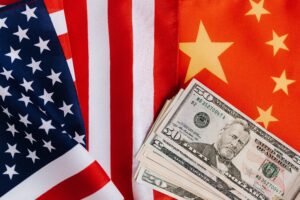Unveiling the 10 Key Players in International Politics Today
In the intricate tapestry of global politics, certain figures emerge as pivotal players, shaping the course of international affairs. From heads of state to influential diplomats, these individuals wield significant influence on the world stage. In this comprehensive exploration, we delve into the key players who currently dominate the landscape of international politics.
1. Heads of State: Leading the Charge
At the forefront of global diplomacy stand the heads of state, whose decisions resonate far beyond their national borders. From the United States to China, leaders such as President Joe Biden and President Xi Jinping command attention with their policies and actions, shaping the trajectory of international relations.
2. Diplomatic Powerhouses: Negotiating the Future
Diplomacy lies at the heart of international relations, and certain individuals excel in this arena. Figures like Secretary of State Antony Blinken and Foreign Minister Sergey Lavrov navigate complex geopolitical challenges, forging alliances and brokering agreements that impact nations around the world.
3. Economic Titans: Driving Global Markets
In an interconnected world, economic prowess often translates into political influence. Leaders such as Chancellor Angela Merkel and President Emmanuel Macron wield significant power through their stewardship of robust economies, shaping trade agreements and financial policies that reverberate across continents.
4. Military Commanders: Defending National Interests
Amidst geopolitical tensions and security threats, military leaders play a crucial role in safeguarding national interests. Figures like General Mark Milley and General Xu Qiliang command formidable armed forces, deterring adversaries and maintaining stability in regions of strategic importance.
5. Multilateral Champions: Advocating Global Cooperation
In an era marked by complex challenges, multilateral institutions serve as forums for dialogue and cooperation. Figures such as UN Secretary-General António Guterres and EU Commission President Ursula von der Leyen champion international collaboration, addressing issues ranging from climate change to human rights on the global stage.
6. Rising Stars: Emerging Voices in International Affairs
While established leaders command attention, emerging figures also shape the dynamics of international politics. From Kamala Harris, the Vice President of the United States, to Yoshihide Suga, the Prime Minister of Japan, these rising stars bring fresh perspectives and energy to the global arena.
7. Thought Leaders: Shaping Discourse and Policy
Beyond governmental roles, intellectuals and experts wield influence through their ideas and analysis. Figures like Dr. Henry Kissinger and Dr. Condoleezza Rice offer insights that shape policy debates and inform decision-making at the highest levels of government.
8. Humanitarian Advocates: Promoting Global Welfare
In a world beset by crises, humanitarian leaders play a vital role in alleviating suffering and promoting human dignity. From Melinda Gates to Malala Yousafzai, these advocates champion causes such as education, healthcare, and gender equality, transcending borders to make a positive impact on the lives of millions.
9. Tech Innovators: Reshaping the Global Landscape
In the digital age, technology leaders wield unprecedented influence, shaping how societies communicate, innovate, and interact. Figures like Elon Musk and Jack Ma not only revolutionize industries but also influence geopolitical dynamics through their companies’ global reach and technological advancements.
10. Cultural Icons: Amplifying Soft Power
Culture serves as a powerful tool for projecting influence and shaping perceptions on the world stage. From Beyoncé to BTS, cultural icons transcend borders, fostering connections and influencing attitudes across diverse communities, thereby contributing to the soft power of their respective nations.
In conclusion, the landscape of international politics is shaped by a diverse array of key players, each contributing their unique perspectives, skills, and influence to the global stage. By understanding the roles and impact of these individuals, we gain insight into the complexities of modern geopolitics and the forces that drive global affairs.
Navigating the Complexities: Challenges and Opportunities
While the key players in international politics wield considerable influence, they also face a myriad of challenges and opportunities in navigating the complexities of global affairs.
Geopolitical Tensions: Balancing Act on the World Stage
One of the foremost challenges confronting international leaders is the management of geopolitical tensions. From territorial disputes to ideological conflicts, navigating the delicate balance of power requires astute diplomacy and strategic foresight.
Economic Interdependence: Harnessing Globalization
In an era of economic interdependence, world leaders must grapple with the opportunities and risks posed by globalization. While interconnected markets offer vast potential for growth and cooperation, they also expose nations to vulnerabilities such as financial crises and trade disputes.
Technological Disruption: Adapting to the Digital Age
The rapid pace of technological innovation presents both opportunities and challenges for global stakeholders. From cybersecurity threats to the ethical implications of artificial intelligence, harnessing the benefits of technology while mitigating its risks requires agile governance and international cooperation.
Climate Crisis: Addressing Urgent Environmental Concerns
The looming specter of climate change presents perhaps the most pressing challenge for international actors. From rising sea levels to extreme weather events, the consequences of environmental degradation are felt across the globe, necessitating collective action and bold policy measures to mitigate the impact.

Forging Pathways to Cooperation: Diplomacy and Dialogue
Amidst these challenges, the key players in international politics must prioritize diplomacy and dialogue to forge pathways to cooperation and peace. Whether through multilateral forums or bilateral engagements, fostering mutual understanding and trust is essential for addressing shared challenges and advancing common interests.
Diplomatic Engagement: Building Bridges Across Borders
At the heart of effective diplomacy lies the art of building bridges across borders. By engaging in constructive dialogue and negotiation, diplomatic leaders can find common ground and seek mutually beneficial solutions to complex issues, from nuclear proliferation to regional conflicts.
Multilateralism: Strengthening Global Institutions
Multilateral institutions serve as crucial platforms for fostering cooperation and addressing global challenges. By upholding the principles of multilateralism and supporting institutions such as the United Nations and the World Trade Organization, international actors can work together to promote peace, security, and sustainable development.
Track II Diplomacy: Engaging Civil Society and Non-State Actors
Beyond official channels of diplomacy, Track II initiatives play a vital role in promoting dialogue and reconciliation. By engaging civil society organizations, academia, and non-state actors, global leaders can harness the power of grassroots movements and public opinion to build momentum for positive change.
Embracing the Power of Collaboration: Towards a Shared Future
In an increasingly interconnected world, the key players in international politics must recognize the power of collaboration in addressing shared challenges and shaping a more peaceful and prosperous future for all.
Partnerships for Progress: Leveraging Collective Strength
By forging strategic partnerships and alliances, international stakeholders can leverage their collective strength to tackle pressing issues such as poverty, inequality, and global health pandemics. Whether through development assistance or joint initiatives, pooling resources and expertise is essential for achieving meaningful impact on a global scale.
Innovation and Adaptation: Harnessing the Spirit of Creativity
Innovation and adaptation are essential qualities for navigating the complexities of the modern world. Leaders who embrace creativity and innovation can unlock new solutions to age-old problems, from sustainable development to conflict resolution, fostering resilience and agility in the face of uncertainty.
Empowering Future Generations: Investing in Youth Leadership
As stewards of the future, global leaders must prioritize investing in youth leadership and empowerment. By providing opportunities for education, skill-building, and civic engagement, nations can cultivate a new generation of leaders equipped to tackle the challenges of tomorrow and drive positive change in their communities and beyond.
Conclusion: Towards a More Sustainable and Inclusive World
In conclusion, the key players in international politics hold immense responsibility and opportunity in shaping the course of global affairs. By prioritizing diplomacy, cooperation, and innovation, they can navigate the complexities of the modern world and forge pathways to a more sustainable, peaceful, and inclusive future for all.















